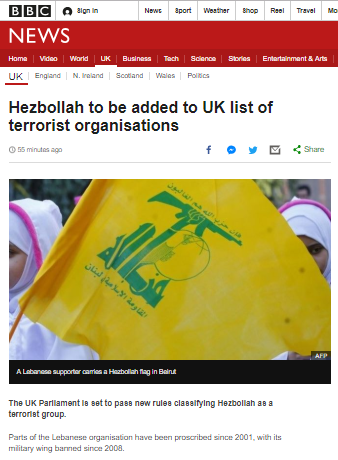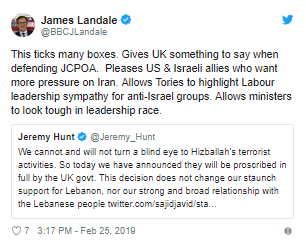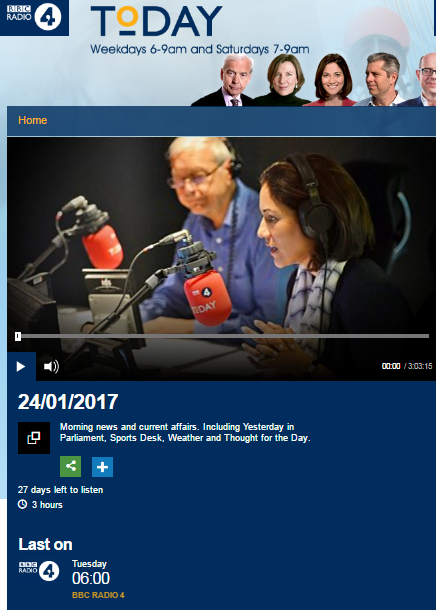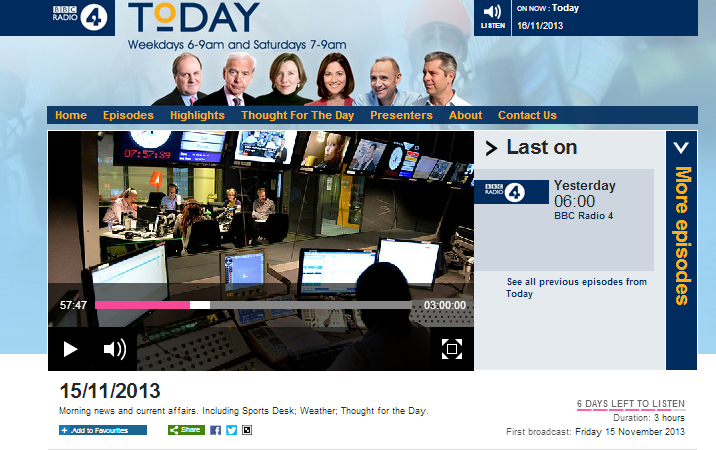A report titled “Hezbollah to be added to UK list of terrorist organisations” was published on the BBC News website’s ‘UK’ and ‘Middle East’ pages on the afternoon of February 25th.
“The UK Parliament is set to pass new rules classifying Hezbollah as a terrorist group.
Parts of the Lebanese organisation have been proscribed since 2001, with its military wing banned since 2008.
UK authorities say they are no longer able to distinguish between the group’s military and political wings.
The changes are expected to take force from Friday, after which supporting Hezbollah will be an offence carrying a sentence of up to 10 years in prison.
Hezbollah – translated as the Party of God – is a Shia Islamist political, military and social organisation that wields considerable power in Lebanon.”
Once again BBC audiences saw the terror group described as being “backed by Iran”.
“The group, which is backed by Iran, has sent thousands of its fighters to Syria to support forces loyal to President Bashar al-Assad in battles against predominantly Sunni Muslim rebel forces and the jihadist Islamic State group.”
That euphemistic portrayal obviously does not contribute to audience understanding of the fact that Iran funds its proxy in Lebanon to the tune of hundreds of millions of dollars a year.
Later on readers found another statement seen frequently in previous BBC content.
“Hezbollah was formed as a resistance movement during the Israeli occupation of southern Lebanon in the early 1980s.”
The origins of Hizballah actually pre-date the First Lebanon War of June 1982. As the FDD’s Tony Badran has written:
“The big bang theory of Hezbollah that puts the Israeli occupation at the alpha point is based not in fact but in legend—it’s an Israel-centric myth that makes the Jewish state Hezbollah’s motivation and prime mover. In reality, the story of Hezbollah’s origins is a story about Iran, featuring the anti-shah revolutionaries active in Lebanon in the 1970s, years before Israel’s intervention.”
Readers are told that:
“Mr Javid’s Israeli counterpart Gilad Erdan welcomed the decision on Twitter and called on the EU to follow suit.”
The Ministry of Public Security which Mr Erdan currently heads is not the equivalent of the UK Home Office and is not the body which designates terror organisations. In Israel that function is the responsibility of the Minister of Defence.
The report also promotes some debatable interpretations of the Home Secretary’s decision from the BBC’s diplomatic correspondent.

As regular readers will be aware, the BBC has spent years cultivating the myth of separate ‘wings’ of Hizballah and downplaying the fact that it is a terrorist organisation through use of euphemisms such as “Lebanese Shia group” or “Lebanese political and military group”.
While we may now expect to see less of the notion of different ‘wings’ of Hizballah in BBC content, it is unlikely that the UK government’s decision to proscribe the whole organisation as a terrorist entity will prompt the BBC to abandon its use of unhelpful terminology such as the phrase “militant group” – as seen in this latest report.
Related Articles:
BBC News disregards al Quds Day hate in London once again
BBC News gives anodyne portrayal of new Lebanese government
BBC News promotes Hizballah’s lexicon and a false narrative




